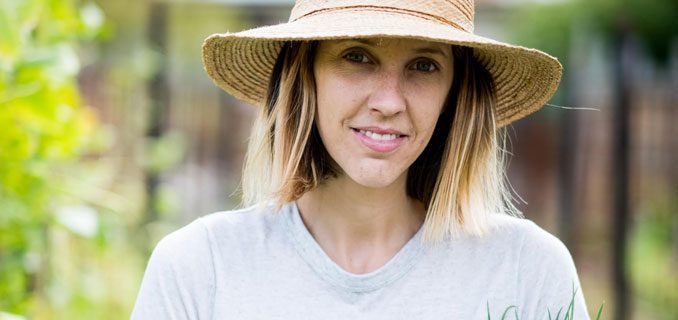
General Manager and founding board member of Pocket City Farms in Camperdown, Emma Bowen is changing the way the community grows food. With a passion for sustainability living, Emma found a way to use her skills to create something new. Last year, Pocket City Farms won the Sustainable Innovation Award at the Inner West Council Business Environment Awards. She speaks to Ciao about her favourite meal and what inspired her to move from magazine editing to urban farming.
Can you explain the concept behind an urban farm?
An urban farm is the same as many others, except we grow our food in the city, right where a majority of us live. There’s some really great examples of urban farms across Australia, and internationally that have gotten creative with finding space to grow in such dense and expensive areas. Our farm is on the old Camperdown Bowling Club that had been closed down for several years before we took it over in 2016 as part of Camperdown Commons. We have turned the old bowling greens into a 1200m2 market garden, along with a community food forest, composting system, greenhouse, chooks, native bees and lots of community interaction and activities within.
What inspired you to create the first of its kind in Sydney?
We were a couple of city dwellers working in publishing and architecture who were disconnected from our own food sources as a result of living in the city and being so removed from it. We had a drive to give up the office life and make those connections ourselves through organic and regenerative farming. I was editing a magazine on sustainable living, my passion, and was inspired by having spoken with the guys who founded Brooklyn Grange in New York (2.5 acres of rooftop farms). We decided to give farming a go in the city for a few reasons – we loved living here, and because we made the assumption that if we were disconnected from farming and food growing – so were most of the people living in Sydney – and that urban farms are a fantastic, positive way to begin bridging that divide.
How did you become interested in working with nature and pursuing a business that focused on environmental concerns?
Hmm I’m not sure – I’m inclined to say responsibility or common sense! As a society, I think we’ve been affording ourselves the luxury of assuming that others will carry the weight of caring for the Earth, reconnecting communities, growing our food, cleaning our air and our water, and making life on the planet sustainable for a fast growing population.
I think we all have the responsibility to not turn a blind eye to our current environmental situation and to not be selfish in our individual and capitalist goals – to not assume it will be the work of others to keep our world clean and liveable. I feel proud in my work that an urban farm that grows clean food in the city, helps connect local community and introduces a way to connect with our food sources and learn more about farming is a positive way to contribute. Plus, working with nature and building soil is the best!
What’s your favourite thing about living and working in the Inner West?
There’s a fantastic collaborative and supportive community in the inner west among both individuals and businesses, and a really strong sense of doing business and living life ethically and sustainably. Zag (my life partner Michael Zagoridis, also co-founder and farm manager at Pocket City Farms) and I have lived in the inner west for the past decade, our son is now growing up here, and after five years searching for a space to set up our farm in Sydney it was so wonderful that the opportunity we eventually landed was right in our own neighbourhood!
How does Pocket City Farms fit in with the wider sustainability concerns that Australia is facing?
Some of the huge issues we are facing include a lack of understanding around food seasonality and the transport, energy and health ramifications associated; organic farming vs monoculture farming; an ageing population of farmers; lack of support for farmers growing ecologically; a convenience food culture affecting nutrition and physical and mental health; lack of green spaces in cities affecting air quality, mental health and community interaction; food waste going to landfill; stormwater runoff from cities; raised temperatures in cities as a result of urban heat island effect; among others. It all begins to sound depressing when you get a list going! However, urban farms make a positive contribution to all of these concerns. How great would it be to get more urban farms growing our food across our cities!
What’s your meal of choice after a long day farming in the city?
Gazpacho! It’s so quick and easy, takes in the best of summer, is so good for hot days, and uses up any seconds tomatoes. We love it with some of our fave Two Chaps sourdough.
GAZPACHO BY EMMA
1kg of tomatoes, chopped
1 long pepper or half a capsicum
1 cucumber, chopped
1 red onion, or half a white onion, chopped
1 clove garlic
Splash of a sweet vinegar, like apple cider, white wine or sherry
Good pinch or two or three of salt
1/2 cup extra virgin olive oil
Use cold ingredients if you want to eat it straight away. Blend everything except the olive oil together until smooth. Pour the oil in slowly while blending (the mix will turn orange and emulsify). Add more olive oil if still seems watery and adjust vinegar and salt to taste. Strain through a strainer (push it through with a spoon). Chill til really cold. Serve it with sourdough and plenty of Botanical Cuisines cultured vegan butter.
